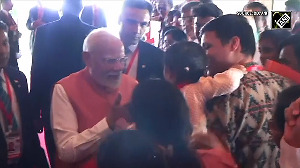At the invitation of Prime Minister Dr Manmohan SinghLi Keqiang, Premier of the State Council of the People's Republic of China, is on a state visit to India from May 19 to 22.
Li held talks with Singh and will call on President of India, Pranab Mukherjee. The leaders of the two countries had an in-depth exchange of views on bilateral relations and regional and international issues of mutual interest in a sincere and cordial atmosphere and reached broad consensus.
The two sides reviewed with satisfaction the comprehensive and rapid progress of India-China relations in the 21stcentury. Over the years, India and China have evolved an effective model of friendly coexistence and common development, which can be an example for relations between big, neighboring countries.
The two sides reaffirmed their commitment to abide by the principles and consensus arrived at by leaders of the two countries over the years concerning the development of India-China relations, and to further consolidate the strategic and cooperative partnership for peace and prosperity on the basis of the five principles of peaceful coexistence and mutual sensitivities for each other concerns and aspirations.
India and China have a historic opportunity for economic and social development and the realization of this goal will advance peace and prosperity in Asia and the world at large. The two sides welcome each other's peaceful development and regard it as a mutually reinforcing process.
There is enough space in the world for the development of India and China, and the world needs the common development of both countries. As the two largest developing countries in the world, the relationship between India and China transcends bilateral scope and has acquired regional, global and strategic significance.
Both countries view each other as partners for mutual benefit and not as rivals or competitors.
The two sides hold that the right of each country to choose its own path of social, economic and political development in which fundamental human rights and the rule of law are given their due place, should be respected.
The two sides will not allow their territories to be used for activities against the other. The two sides are committed to taking a positive view of and support each other's friendship with other countries.
Recognising the growing bilateral relationship and the increasing global importance of both India and China, the two sides agreed to a regular exchange of visits between the heads of state/government of the two countries.
The leaders of the two countries will also continue to meet on the sidelines of important multi-lateral forums.
The two sides attached great importance to the active role of the strategic economic dialogue in promoting macro-economic policy coordination and pragmatic cooperation in various fields between the two countries and expressed satisfaction over the progress made in the meetings of the dialogue.
They agreed to further strengthen cooperation in the areas of energy and environmental conservation, new and renewable energy and high-technology. The two sides agreed to enhance cooperation in the railway sector including heavy haulage and station development.
Considering the rapid changes in the world economic situation, the two sides tasked the strategic economic dialogue mechanism to consider issues of macro-economic coordination, and to suggest possible responses by the two countries. Both countries share a common interest in preventing protectionism and in an open multilateral trading system.
The two sides agreed to continue pushing forward the Doha development round, consider the potential for a bilateral regional trade arrangement and review the state of negotiations on the Regional Comprehensive Economic Partnership.
The first meeting of the India-China CEO's Forum was held during Premier Li Keqiang's visit to India. The prime ministers of both countries look forward to the recommendations of the forum to further enhance bilateral trade and investment.
While striving to realize the trade turnover target of US$ 100 billion by 2015, the two countries agreed to take measures to address the issue of the trade imbalance.
These include cooperation on pharmaceutical supervision including registration, stronger links between Chinese enterprises and the Indian IT industry, and completion of phytosanitary negotiations on agro-products.
The Indian side welcomed Chinese enterprises to invest in India and participate in India's infrastructure development. The project contracting cooperation between the businesses of the two countries would be enhanced.
The two sides expressed willingness to carry out cooperation on establishing industrial zones so as to provide platforms for cluster-type development of enterprises of the two countries.
The two sides agreed to strengthen cooperation between their financial regulators, and support their banking institutions in setting up representative offices, branches or subsidiaries, and carrying out business activities subject to relevant laws and regulations. The two sides agree to promote cooperation between their financial institutions to provide funding for bilateral economic cooperation projects.
The two sides agreed to focus on areas of mitigation and management of earthquake and natural disasters, astronomy and astrophysics, technology research on climate change, traditional knowledge and medicine within the framework of India-China committee of science and technology cooperation.
To pursue mutual benefit and fulfill their international cooperation objectives, both India and China agreed to consider collaborating on development projects of common interest in third countries.
India and China decided to mark the 60th anniversary of the fve principles of peaceful coexistence (Panchsheel) in 2014 by designating it as the "Year of Friendly Exchanges". The two sides noted that youth exchanges play an important role in increasing mutual understanding and decided to continue with the annual exchange of 100 youth.
Both sides encouraged Hanban on the Chinese side and the Central Board of Secondary Education on the Indian side to enhance their cooperation on Chinese language teaching. In accordance with the agreement to facilitate cooperation and linkages between Indian and Chinese cities and states/provinces, the two sides agreed to encourage their cities/provinces to establish twinning relationships.
To promote trade, personnel movement and connectivity across the border, the two sides agreed to consider strengthening border trade through Nathu La Pass. The Chinese side shall provide greater facilitation to Indian pilgrims for the Gang Renpoche and Mapam Yun Tso Pilgrimage (Kailash Manasarovar Yatra).
The Indian side conveyed appreciation to the Chinese side for the improvement of facilities for the Indian pilgrims. The two sides agreed to enhance media exchanges and cooperation to improve the mutual understanding and friendship of the two peoples, and to hold a India-China high-level media forum.
The two foreign ministries will work closely together in this aspect. They also decided to complete the compilation of the Encyclopedia of India-China Cultural Contacts in 2014, and agreed to jointly start the project of translating each other's classic and contemporary works.
The two sides appreciated the progress made in promoting cooperation under the BCIM (Bangladesh, China, India, Myanmar) regional forum. Encouraged by the successful BCIM car rally of February 2013 between Kolkata and Kunming, the two sides agreed to consult the other parties with a view to establishing a Joint Study Group on strengthening connectivity in the BCIM region for closer economic, trade, and people-to-people linkages and to initiating the development of a BCIM economic corridor.
In view of the expanding trade and commerce and growing people-to-people contacts, it was agreed to work towards simplifying visa procedures.
As large developing countries committed to promoting the use of clean energy, India and China believe that expansion of civil nuclear energy program is an essential component of their national energy plans to ensure energy security.
The two sides will carry out bilateral cooperation in civil nuclear energy in line with their respective international commitments.
The two sides reaffirmed their commitment to promoting multilateral arms control, disarmament and non-proliferation processes. They support the complete prohibition and thorough destruction of all nuclear weapons and reaffirm their opposition to the weaponisation of and an arms race in outer space.
The two sides agree to further enhance bilateral cooperation on maritime security, searching and rescuing at sea, oceanic scientific research and environment protection, work together to tackle increasingly outstanding non-traditional security threats, and strengthen cooperation in naval escort missions in the Gulf of Aden and waters off the coast of Somalia, earnestly safeguarding security of international sea-lanes and freedom of navigation.
The two sides noted that enhanced interaction in the military field was conducive to building mutual trust and confidence. Both sides agreed to hold the next round of joint training exercises later this year. Both sides also decided to increase exchanges between the army, navy and air force of the two countries.
The leaders expressed satisfaction over the work done so far by special representatives of the two countries on the boundary question and encouraged them to push forward the process of negotiations and seek a framework for a fair, reasonable and mutually acceptable settlement in accordance with the agreement on political parameters and guiding principles.
Pending the resolution of the boundary question, the two sides shall work together to maintain peace and tranquility in the border areas in line with the previous agreements. The two sides noted with satisfaction that the meetings of the India-China working mechanism for consultation and coordination on border affairs held till date have been fruitful.
The Indian side expressed appreciation to China for providing flood-season hydrological data and the assistance in emergency management. The two sides will further strengthen cooperation on trans-border rivers. They agreed to cooperate through the expert level mechanism on provision of flood-season hydrological data and emergency management, and exchange views on other issues of mutual interest.
The two sides expressed satisfaction at the enhanced bilateral engagement at the working level on wide-ranging issues of regional and global significance. Bilateral consultations on Afghanistan, West Asia, Africa and Counter-terrorism have been held recently and those on central Asia, maritime affairs and disarmament, non-proliferation and arms control will be held soon.
Both sides agreed that the Afghanistan issue concerns regional security and stability. As two important countries in the region, they reiterated their support for an "Afghan-led, Afghan-owned” reconciliation process and their commitment to working with regional countries and the international community to help Afghanistan achieve its objective of peace, stability, independence and development at an early date.
The Asia-Pacific region plays an increasingly important role in global affairs. The two sides are of the view that the current priority of this region is to maintain peace and stability of the region, promote regional common development, as well as to establish an open, transparent, equal and inclusive framework of security andcooperation based on the observance of the basic principles of international law.
The two sides support multilateral cooperation mechanisms in Asia, take a positive view of each other's participation in regional and sub-regional cooperation processes, and support each other in enhancing friendly relations with their common neighbors for mutual benefit, and win-win results.
Both sides agree to broaden cooperation in the East Asia Summit, the Shanghai Cooperation Organisation, the South Asian Association for Regional Cooperation and the Asia-Europe Meeting.
The two sides believe that the 21st century should be marked by peace, security, development and cooperation. The promotion of multi-polar world, economic globalisation, cultural diversity and information revolution are high on the global agenda. The two sides will make joint efforts to democratise international relations and strengthen the central role of the United Nations in promoting global peace, security and development.
Noting their convergence on global issues, both sides agreed to enhance their cooperation in multilateral forums including United Nations. China attaches great importance to India's status in international affairs as a large developing country, understands and supports India's aspiration to play a greater role in the United Nations including in the Security Council.
As developing countries, India and China share common interest on several issues of global importance such as climate change, Doha Development Round of WTO, energy and food security, reform of the international financial institutions and global governance.
This is reflected in the close cooperation and coordination between the two sides within the BRICS and G-20 frameworks. The two sides agreed to enhance coordination in the follow up process of the UN conference on sustainable development and in discussions on the post 2015 development agenda as well as international negotiations on climate change.
Both sides reiterated their resolute opposition to terrorism in all its forms and manifestations and committed themselves to cooperate on counter-terrorism. They also emphasized the need to implement all relevant UN resolutions, in particular UNSC resolutions 1267, 1373, 1540 and 1624.
Premier Li Keqiang, on behalf of the Chinese government and people, expressed his appreciation to the government and people of India for their warm hospitality. Premier Li invited Prime Minister Dr Manmohan Singh to visit China at a mutually convenient time and Prime Minister Singh accepted the invitation with pleasure.
The dates of the visit will be decided through diplomatic channels.











